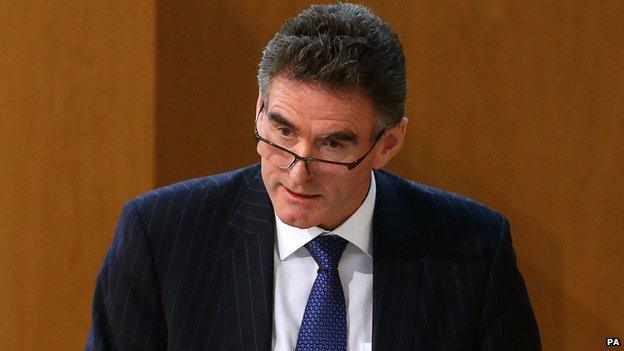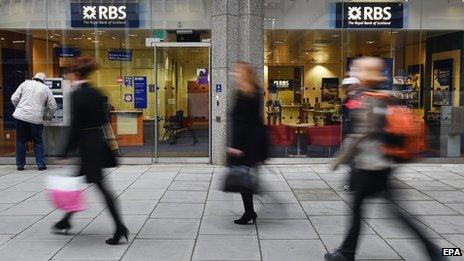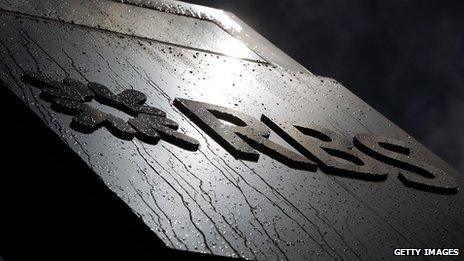RBS – the amazing shrinking bank
- Published
- comments

Ross McEwan, when he's waded through the arguments about why bankers are paid lots of money, is running a bank that in many respects is on the road to recovery.
Yes, legal costs for misconduct are ballooning (£2.2bn has been "provisioned" for 2014) but its core operation is actually making a profit of more than £3bn.
That is for two reasons.
The bank has removed itself from a lot of tricky, low profit investment banking activities in countries where returns were volatile.
And, given its UK focus, it is gaining from the improvement in the economy.
"We have seen [the advantage] of taking assets off our books that don't add value to this bank and we're about to take off some corporate institutional banking assets that will not be part of our future," Mr McEwan told me.
"RBS will be stronger, it will be simpler and it will be much more focused on the UK large corporates and the western European corporates and our big financial institutions."
RBS is now focused on providing relatively vanilla services to individuals and businesses in the UK and Western Europe, with a small operation in Asia.
And as the economy grows, those can be pretty lucrative businesses.
"The days when global domination mattered more to RBS than great customer service are well and truly over," Mr McEwan said.

'Substantial' job losses
Of course, a smaller bank means fewer staff. I asked Mr McEwan about the threat of job losses for the bank.
"It will be a substantial number," he said.
"This business employs about 118,000 people and it will be a much smaller business."
I asked him if the number of job losses could be in the thousands. Yes, he replied.
And, given that RBS is pulling out of 25 countries (bringing the number it operates in down to 13), most of those jobs losses are likely to be outside Britain.
Misconduct issues
What has become clear is that seven years on from the financial crisis, banks are still labouring to deal with major misconduct issues.
The cultural problems - and by that I mean how bankers operated across a myriad of operations - are far deeper than anyone thought in 2008.
Mr McEwan admitted to me that the job of cleaning up RBS had been a tough one.
"It's certainly been harder and it's in different areas from what we thought seven years ago," he said.
"A lot of these conduct issues I don't think anyone thought we would be caught up in - foreign exchange, Libor and even PPI [the mis-selling of payment protection insurance] has dragged on for so long.
"These are really debilitating for banks and for capital.
"We're trying to build capital - but those issues weren't anticipated seven years ago. That's why we have to become a much better bank, focused on customers, so that we don't keep sleepwalking into these issues."

Taxpayer return?
The share price has ticked down this morning, drifting towards 390p. Investors clearly see a lot of work remains to be done at RBS.
And that means, in share price terms, the government is slightly further away from being able to sell its stake at a profit.
For the tax payer to "break even" on the billions of pounds it paid to rescue RBS, the bank's share price will need to be above 455p.
When will the tax payer finally see some return on its stake?
"I don't have a time frame," Mr McEwan said. "We are working on building a very good bank."
I pushed him a bit further.
"I'm certainly not talking months - I think the government will be in a much better position as we head into 2016 to start thinking about the proposition of selling parts or all of this bank."